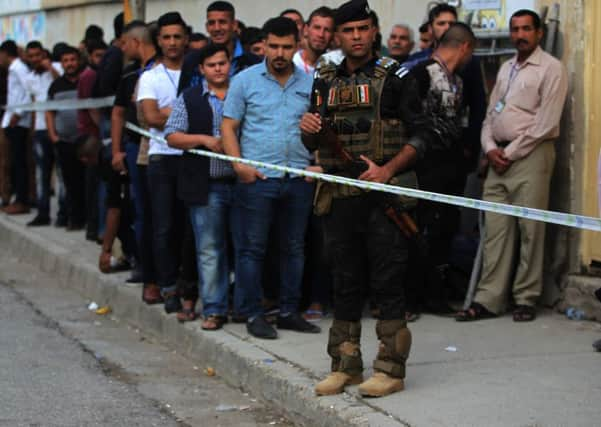Iraqis queue to cast vote in first election since downfall of IS


After hours of low voter turnout, Iraqi Prime Minister Haider al-Abadi partially lifted a security curfew to encourage more people to come to the polls.
After weeks of official campaigning, no clear front-runner had emerged as al-Abadi faced stiff competition from parties with closer ties to Iran.
Advertisement
Hide AdAdvertisement
Hide AdThe announcement from al-Abadi’s office that a ban on civilian cars and buses in all provinces was partially lifted came after hours of relatively low turnout in Baghdad.
The curfew had been in place since midnight the night before and many voters complained of having to walk more than 2.5 miles to reach polling stations.
Iraq’s most senior Shiite cleric spoke out on the issue of voter participation yesterday afternoon, encouraging Iraqis to vote “to prevent the arrival of a corrupt parliament”.
“The lack of participation will give the opportunity for others to reach parliament and they will be very far from the aspirations of the people,” said Sheikh Abdul-Mahdi al-Karbalai, the representative of Grand Ayatollah Ali al-Sistani, on local Iraqi television from Karbala. Sistani has repeatedly encouraged Iraqis to vote in the elections and elect a new political class to combat corruption.
In central Baghdad, voters supporting al-Abadi said they were doing so because they gave him credit for Iraq’s military victory over IS.
Al-Abadi “took revenge” for civilians killed in insurgent attacks in Iraq “with the victory over Daesh”, said 71-year-old Felihah Hassan, using the Arabic acronym for IS.
After IS overran nearly a third of Iraq in the summer of 2014, the group launched waves of suicide bombings targeting civilians in Baghdad and other pockets of government-controlled territory.
With support from the US-led coalition and Iran, al-Abadi oversaw a gruelling war against the extremists and declared victory over the group in December last year.
Advertisement
Hide AdAdvertisement
Hide AdSince then, Baghdad has experienced a relative lull in insurgent-style attacks, but in the lead-up to yesterday’s vote Iraqi security forces have imposed tight security measures.
Despite al-Abadi’s military achievements, Iraq continues to struggle with an economic downturn sparked in part by a drop in global oil prices, entrenched corruption and years of political gridlock.
The prime minister’s most powerful opponents are his predecessor, Nouri al-Maliki, and an alliance of candidates with close ties to the country’s powerful, mostly Shiite paramilitary forces.
The alliance, called Fatah – Arabic for Conquest – is headed by Hadi al-Amiri, a former minister of transport who became a senior commander of paramilitary fighters in the fight against the IS group. Many of the candidates on his list were also paramilitary commanders before they cut their official ties with the force in order to seek office.
Jassim Mohsen, 58, who fought against IS with the paramilitary forces, said he was casting his vote for the alliance because of their personal sacrifices.
“I elected the Fatah list because they are the only ones who fought Daesh and gave blood,” he said.
Another key player in the vote was the influential cleric Muqtada al-Sadr.
He commanded fighters in the war against IS and headed a powerful militia that fought US forces in Iraq before that, but his election campaign focused on social issues and eliminating government corruption.
Advertisement
Hide AdAdvertisement
Hide AdTurning out to vote yesterday, some members of the Sunni community – which bore the biggest brunt of the conflict – said they were hopeful that the election would help Iraq move beyond sectarian politics and become more inclusive.
Abdulrazaq Kubi and his wife Suheila Mahdi, both Sunnis from Baghdad, said they would not be voting for al-Abadi, casting their votes instead for a Sunni-led political alliance.
“The victory is not 100 per cent, there is still Daesh here,” said Mahdi.
The government , he added, was “neglecting the refugees because they are Sunni.
“They left them in the camps. In the winter it floods, in the summers they go hungry,”